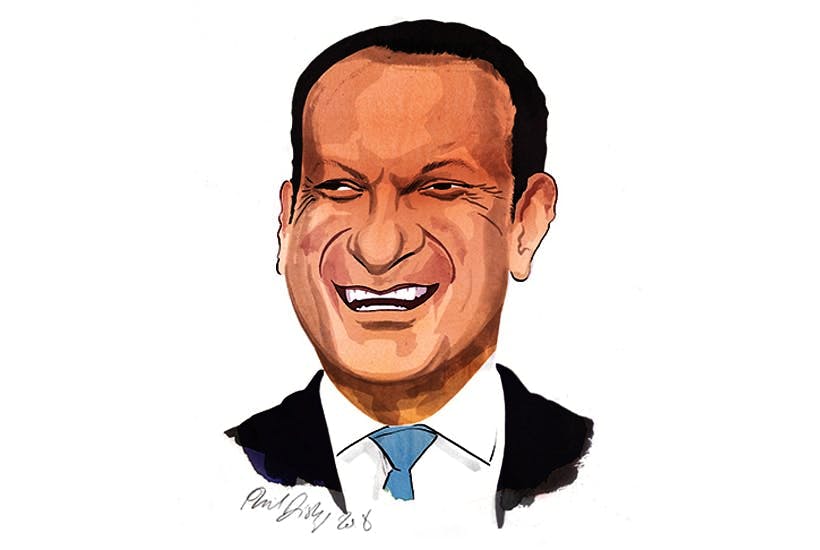A few decades ago, Irish people would march through the streets of London to holler at the British government: ‘Hands off Ireland!’ I wish Irish people would now take to the streets of Dublin to say to Leo Varadkar’s government: ‘Hands off Britain!’ For Varadkar’s meddling in British politics, his and his minions’ attempts to scupper Britain’s break from the European Union, is profoundly anti-democratic. What we have here is a foreign leader interfering in Britain’s domestic, democratic affairs. It was wrong when the British did that to Ireland, and it is wrong for the Irish now to do the same to Brexit Britain.
The way Varadkar, the Taoiseach, talks about Britain is astonishing. It is arrogant, entitled, and motored by the elitist, practically imperial belief that what is good for his government — his foreign government — is more important than what the British people themselves, in their millions, voted for.
In recent days he has, in the words of the BBC, ‘ruled out’ any further British renegotiation of the withdrawal agreement with the EU. Who does he think he is? His foreign affairs minister, Simon Coveney, has suggested Britain should deactivate Article 50. Last year an overwhelming majority of elected members of the British parliament — 498 to 114 — voted to trigger Article 50, which started the process of our leaving the EU, and yet here comes a foreign politician to suggest we backtrack on that democratic act. It would be as outrageous for a British minister to tell the Irish to overturn the result of their abortion referendum from earlier this year.
How can Irish ministers speak so hubristically about Britain’s internal affairs? Because they have been encouraged to do so by cynical operators in Brussels. The border in Ireland has become the key stumbling block to Brexit not because it really is a stumbling block, but because it was manipulated into one by Brussels oligarchs keen to make Brexit as difficult as possible. And keen to send a warning to other EU member states, every single one of which has a land border with another EU member state, as the UK would in relation to Ireland once (if?) Brexit becomes a reality. The warning says: ‘It’s too complicated to leave the EU. It harms our bloc. It screws up trade. Don’t even think about it or you will suffer like the UK is suffering.’
The cynicism of the scaremongering over the Irish border is captured in a Bloomberg report published at the end of last week. Based on interviews with officials in Dublin and London, the article reveals how feverishly the ‘Irish issue’ was latched on to by those who wanted to weaken or demonize Brexit. In the aftermath of the vote for Brexit, one of the key things ‘at play in Brussels’, reports Bloomberg, was the idea that ‘Northern Ireland was a place where the “fantasies” of the Brexit camp clashed with reality’. So ‘for those seeking to illustrate the difficulties inherent in the wider Brexit project, it was the perfect vehicle’.
This is what many of us suspected: that the Northern Ireland border question was consciously turned into a thorny issue by those who really wanted to cast aspersions on Brexit itself and to lecture the British people about the stupidity and impossibility of the thing they voted for. As a result, says Bloomberg, Irish ministers who felt uncomfortable with Brexit found ‘they were pushing at an open door’ when it came to convincing the EU to run with the so-called Irish problem in their tough talk with the Brits. Bloomberg reports that the EU’s chief negotiator Michel Barnier was ‘particularly receptive’. I bet he was. He finally had what he considered to be a trump card against a proper, clean Brexit — the jumped-up idea that if Britain leaves the EU it will will make life hard for the Irish and possibly even reignite the Troubles.
Ireland has been used by the EU to weaken democracy in Britain. This is the worst thing about this entire cynical spectacle — the way in which a once plucky, independence-desiring republic has allowed itself to become a patsy of the Brussels oligarchy. The Irish chattering classes, virtually all of whom are uncritically pro-EU, cheer Varadkar’s maneuverings against Britain as proof that Ireland is now a grown-up nation and is even bossing about its former imperial rulers. Please. In truth Ireland has made itself into the willing weapon of a new imperial power: Brussels. Rarely in recent decades has a small nation so shamelessly prostrated itself before a foreign power. Ireland might be irritating its old colonial rulers, but it does so at the behest of its new ones. It makes me feel embarrassed to be Irish to watch Ireland become the Uncle Tom of European affairs.
And if Ireland thinks fronting the EU’s Brexitphobic strategy will protect it from EU disfavor in the future, it has another thing coming. The EU doesn’t care about Ireland. It has twice conspired in the overthrow of democratic Irish votes against EU treaties. It sent the troika to colonize Ireland’s economic affairs in 2010. And just this month it ruled that Irish quangos have the right to ignore Irish laws in favor of EU ones, damaging Irish democracy and creating tensions in Irish public life. For Ireland to suck up to an institution that treats it with such contempt is one of the most ignominious things happening in Europe right now.
This article was originally published onThe Spectator’s UK website.


















